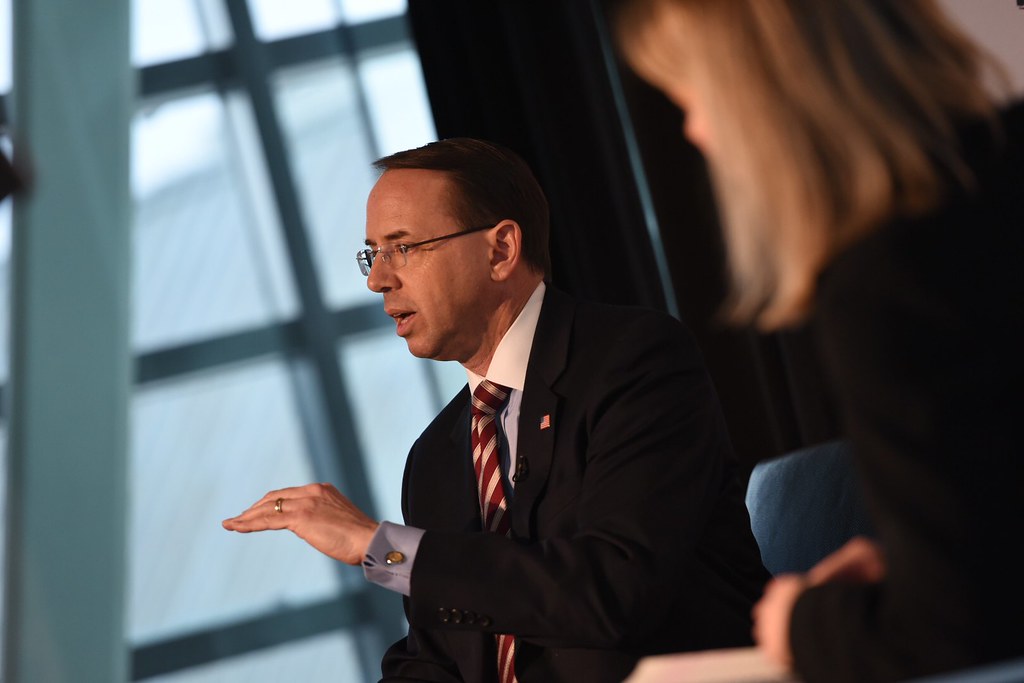Former counsel for the U.S. House Judiciary Committee, who helped draft articles of impeachment for Richard Nixon, speaks out on Trump’s efforts to interfere with Robert Mueller’s investigation.
Trump, along with Rep. Devin Nunes and his legal team, has been trying to penetrate Robert Mueller’s investigation going so far this week as sending two of his representatives to issue a warning statement to Congressional leaders and top Justice Department officials during a classified briefing – pushed by Trump.
The Washington Post reported that:
Justice Department and intelligence community leaders conferred twice with top Republican and Democratic lawmakers Thursday, hoping to defuse a partisan conflict over the FBI’s use of a confidential source to aid the investigation into whether the Trump campaign coordinated with Russia.
[…]
Contradicting its earlier position, the White House allowed top Democrats to join their Republican colleagues, and also dispatched two of its own representatives — Chief of Staff John F. Kelly and White House lawyer Emmet T. Flood — to relay a message from the president.
That raised some suspicion , as the matter being discussed concerned an ongoing criminal investigation involving the Trump campaign. Even Sen. Lindsey O. Graham (R-S.C.) told a reporter that the presence of Flood, who is handling the White House response to the special counsel investigation, was “a bit odd.”
Distinguished trial attorney Michael Conway weighed in on the similarities between Trump and Richard Nixon in an opinion piece published by NBC News this Thursday [May 24].
Titled “Trump ‘Spygate’ meeting followed Nixon’s playbook. But having inside information didn’t help Nixon,” Conway’s article explains that “Trump’s effort to force the Department of Justice and the FBI to disclose key elements of the Mueller probe” is not a new trick “nor a particularly effective one.”
Indeed, Conway writes point-blank that Trump’s efforts to thwart the investigation are doomed to fail:
What President Trump has done in public via Twitter and now in a well-publicized meeting, President Richard Nixon had previously done in private by obtaining secret grand jury information from the Assistant Attorney General about the ongoing investigation of his White House aides and his presidential campaign.
Nixon’s efforts, however, could not save his White House and campaign aides from criminal convictions, nor would it have saved him from impeachment had he not chosen to resign. President Trump’s ham-handed efforts will fare no better.
Continuing, Conway goes on to explain that Trump may very well force himself into a trap of his own making:
In Watergate, the Attorney General and the head of the Criminal Division at the Department of Justice were duped into sharing investigative reports with President Nixon… Nixon immediately told key aides what the prosecutors knew, allowing witnesses to mold their stories, and ultimately facilitating the on-going Watergate cover-up.
On April 15, 1973, Attorney General Richard Kleindienst and Assistant Attorney General Henry Petersen gave Nixon a detailed briefing for more than an hour based upon what the Watergate prosecutors had told Kleindienst about the status of the investigation, the witnesses being called and the prosecutors’ strategy.
The next day Petersen gave Nixon a memorandum requested by the president outlining the evidence that implicated key White House aides H. R. Haldeman and John Ehrlichman. Petersen continued to brief the president about the department’s investigation in person and over the telephone in the following days. Despite these compromising disclosures about the prosecutor’s plans, ultimately, both Haldeman and Ehrlichman were tried and convicted of conspiracy, obstruction of justice and making false statements.
Conway concluded his analysis, writing:
Like President Nixon, Donald Trump seeks a return to the days when an FBI Director like J. Edgar Hoover was a ready and compliant participant in the White House’s political agenda, reportedly wondering why Attorney General Jeff Sessions wasn’t acting as his “Roy Cohn” or protecting him the way that former Attorney General Robert F. Kennedy allegedly protecting John F. Kennedy. But the safeguards to the independence of the DOJ instituted after Watergate serve as a barrier to Trump’s desire to once again politicize federal law enforcement.
Our democracy survived Nixon’s attacks on the independence of the Department of Justice, and it will survive Trump’s as well.
For those unfamiliar with Conway, he served as counsel to the United States House Judiciary Committee in the Impeachment Inquiry of President Richard M. Nixon in 1974, where “he assisted in drafting the committee’s final report to the House of Representatives in support of the three Articles of Impeachment adopted by the committee. Conway is a graduate of Yale Law School, a fellow of the American College of Trial Lawyers and a retired partner of Foley & Lardner LLP in Chicago,” according to NBC News and his Foley & Lardner profile.


You must be logged in to post a comment Login